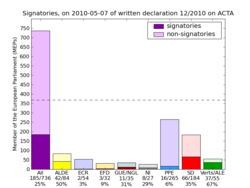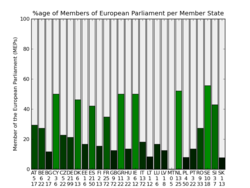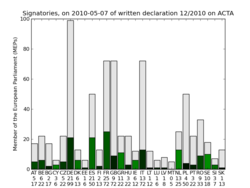Strasbourg, May 17th 2010 – 185 signatures already, 184 left for an absolute majority! The Written Declaration 12 (WD12) on the ACTA agreement is still open for signatures from Members of the European Parliament (MEPs); it is now halfway completed. By setting red lines to the EU negotiators, it addresses key issues of the right to a fair trial and liability of Internet service providers. This week is a plenary week in Strasbourg, where MEPs will have an occasion to sign it. Who are the signatories so far? Who should be contacted in order to get to 369 signatories?
What political groups are the signatories from, so far?
A quick analysis of the signatories per political group graph (click on the image on the right), shows that out of the seven political groups of the European Parliament:
- Only the ALDE (Liberals) and the Greens/EFA groups so far have 50% or more of the members as signatories.
- The S&D (Socialists) group has the highest number of signatories with 66, although with only 35% of its members.
- There are only 16 EPP (Conservatives) signatories, thus only 6% of the EPP group, to add to 2 ECR (Conservatives as well) members. The French delegation of EPP, Nicolas Sarkozy’s UMP party, was apparently instructed not to sign it.
- 3 members of the EFD (Nationalists) surprisingly also signed the WD12, while some of its members announced that since they didn’t recognize EU institutions, they cannot sign it.
What Member States are the signatories from?
An analysis per Member States, shows the following:
- Sweden has the highest percentage of Members signatories: 10/18, closely followed by the Netherlands (13/25). Greece (11/22), Ireland (6/12) and Cyprus (3/6) all have 50% of their Members as signatories.
- On an absolute number point of view, France is leading with 25 out of its 72 Members being signatories, closely followed by Spain and Germany (21).
- United Kingdom only has 9 out its 72 Members as signatories. Probably a consequence of the whole country being focused on General Elections lately?
- Italy is also one of the biggest countries with a fewest number of signatories: only 13 out of 72 Members. Poland rates even worse with 4 out of 50 (not even 10%!).
What to do now?
This analysis leads us to the following recommandations and conclusions:
- United Kingdom, Germany, Italy, and Poland are major “reservoirs” for signatures. NGOs from these Member States should get in touch with concerned citizens and inform their representatives.
- French and Spanish citizens must continue their effort.
- The EPP still has to be convinced. Arguments about the power of the Parliament, and the competitiveness of innovative ICT EU companies related to digital technologies can be favoured. EPP delegations from Eastern countries might be easier to reach.
- It is possible to convince Members of the EFD group, so it is worth trying.
- Many S&D Members are still to sign.
- Some delegation await for a signal from their leaders before signing. They must be identified, and the leaders convinced.
- We can make it! If Members continue to sign at this rate (20-25/plenary day), we have a high chance of getting a majority before the end of July plenary… But that’s only a small dozen of days of plenary from now on, so there is abolutely no time to lose!
Now, using the




